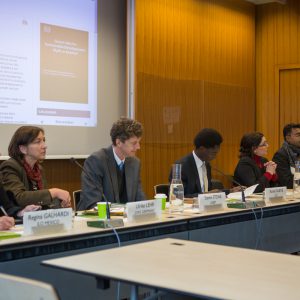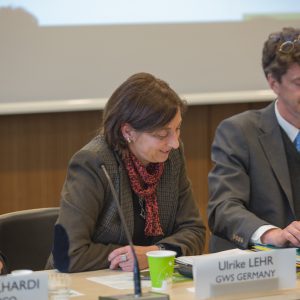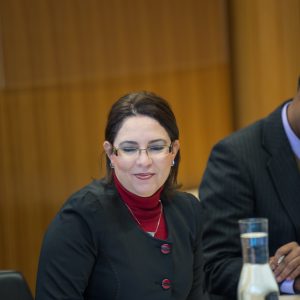Événement
Green Jobs for Sustainable Development | Myth or Reality?

11 Dec 2013
10:00–12:00
Organisation: Geneva Environment Network
Many countries are becoming interested in investment and development strategies that stimulate growth, create jobs and enhance social inclusion in a green economy. Recognizing this growing trend, the Rio+20 Outcome Document “The Future We Want”, devoted a full section on promoting full and productive employment, decent work for all, and social protection. It encouraged each country to consider the implementation of green economy policies in the context of sustainable development and poverty eradication, in a manner that endeavours to drive sustained, inclusive and equitable economic growth and job creation, particularly for women, youth and the poor.
However, a number of questions remain to be answered: What is the evidence that greener economies create more and better jobs? Which economic sectors offer greatest opportunities? What are the needs for skills and human capacity? What are the trade-offs and which transitional arrangements are needed in labour markets?
This event, hosted by the Geneva Environment Network, presented and discussed national experiences from developed and developing countries in promoting employment in sectors that reduce energy and materiel consumption; minimise waste and pollution; limit greenhouse gas emissions and climate change impact; or protect and restore ecosystems – in other words, green and decent jobs.
Panellists:
- Steven STONE, Economics and Trade Branch, UNEP
- Ulrike LEHR, Institute of Economic Structures Research (GWS), Germany
- Riad Mohammed AKHTAR SULTAN, University of Mauritius
- Monia BRAHAM, Ministry of Equipment and Environment, Tunisia
- Regina GALHARDI, International Labour Organization, Mexico
Moderation and facilitation: Moustapha Kamal GUEYE, International Labour Organization.
Introduction – Why green jobs matter and what they are
Approach: Addressing environmental challenges by creating decent jobs. If the economy is working, jobs are produced. However, if it continues in the conventional way, our wealth and livelihood – the environment – is drowned. The question is how to create prosperity without diminishing nature as the source of our prosperity. Three areas which are especially promising for the creation of green jobs: (i) agriculture; (ii) energy efficiency; (iii) processes reclaiming natural heritage such as reforestation, soil restoration etc.
Evidence from research on the issue of green jobs
Case study of Germany: Important sectors for green jobs are water, energy, waste, green products. These sectors are very similar to sectors creating green jobs in developing countries. A lot of money is moved in the green job sectors; hence they do have an impact.Indirect jobs arising from the shift to greener economies are twice as high as direct jobs. Overall, a positive economic impact of greening was detected. Net loss in some sectors such as conventional energy is made up for by increases in other sectors. Overall, the net effect on employment is positive.
Case study of Mauritius: The creation of jobs is a government priority. In 2008 the project ‘Maurice Ile Durable’ was launched to create jobs through greening the economy. Overall, a shift of companies towards greening has been detected in all sectors. More jobs are created along production chains if they are greened, since more labor is required. Investments into greening have proven to generate a significant number of indirect green jobs.
Reflection on Trade: Trade is considered in both country studies as a sector which does provide opportunities for green job creation through direct as well as indirect jobs.
Practical policy implications
Example of Tunisia: Policy opportunities to create green jobs for example through green investment are there. However, the restructuring of the national economy poses many challenges. Tunisia is currently in the process of formulating its green economy act.
Example of Mexico: The ILO is promoting green jobs in Mexico since 2011. Mexico is a leading country in environmental and climate change issues in Latin America, with a green job assessment and a green economy assessment already completed. Synergies from these assessments are aimed to be harnessed through appropriate government uptake of the findings. Notable with the green jobs assessment in Mexico is the inclusion of a “decent work index”, aiming to ensure that jobs created are not only green but also decent.
Example of Ecuador: The initiative of the government to cut national park entrance fees has led to a tremendous increase in visitors, ‘consuming’ nature as a public good in these parks. This increase has large implications for employment. à Small policy decisions can make a big difference.
Through its Green Jobs Programme, the International Labour Organization is working with governments, social partners and other stakeholders to understand better the potential impacts on employment of greening initiatives, with a view to promote i) growth in employment, ii) quality jobs and iii) social inclusion through innovative social protection mechanisms.
More information and documents
Videos
Website
More information on this topic can be found ond the ILO and Green Jobs Programme Website.
You can also contact
Moustapha Kamal GUEYE, Policy Specialist, Green Jobs, ILO
Email: Gueye@ilo.org Tel: +41 22 799 7247
https://www.genevaenvironmentnetwork.org/wp-content/uploads/2020/05/biographies_11_december_2013.pdf
https://www.genevaenvironmentnetwork.org/wp-content/uploads/2020/05/ilo-german_experience.pdf









